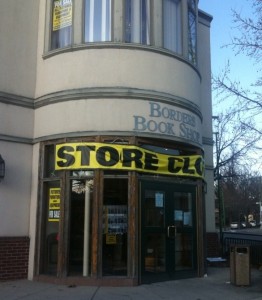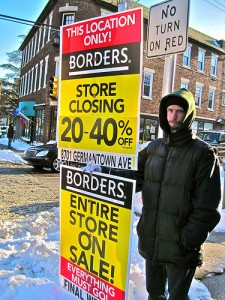This hideous Borders bookstore in Chestnut Hill, PA opened in August 1994, and failing to “meet the company’s objectives,” was shut down earlier this year. The store sat at the top of the hill, where Bethlehem Pike meets Germantown avenue, so was referred to as “The Borders at the top of the Hill”.
From the mid-19th century through the mid-20th, Chestnut Hill served as the functional equivalent of a “railroad and streetcar suburb” of what only Philadelphians refer to as “Center City”. I never lived in Chestnut Hill, but I took the trains and trolleys from school to the “top of the hill”, a common pickup/drop off and directional reference point. Top ‘O is a threshold, a talking point and a cultural hub. It anchors the neighborhood’s commercial corridor and is pontificated on as a landmark by the town-proud residents who love their neighborhood for it’s quaint-i-tude and historical significance (site of the first Wawa).
Chestnut Hill today is still functionally old school with a local hardware store, cheese shop, miniscule candy and pipe shops, and the Belgian-block-paved main street of the neighborhood, Germantown Avenue (SEPTA “temporarily suspended” regular trolley service in 1992 for some reason). Like everywhere, a revolving door of chains and banks (the new CH Coffee Company at Top ‘O is superbamundo), have supplanted most of the stores I remember like The Lady Bug Shop, The Nana Shop, a Needlepoint store, Hobby Store, Aurritts Sporting Goods and most notably, The Frigate Book Shop.
My memories of The Frigate Bookshop, off the main drag, are limited to the Emily Dickinson poem hanging by the register and this tiny black and white photo. But it played a huge part in my life. It’s where I bought Black Beauty and The Long Winter, books I still own. It’s where Karen and I hunted girl’s boarding school books and where my sister bought The Wolves of Willoughby Chase, cementing her fear of wolf attacks forever. It’s where we bought our books.
I’m not sure when The Frigate closed, but it seemed like there was an extended period of time when there was no bookstore in Chestnut Hill. When Borders opened in 1994, my sister, brother and I predictably bemoaned the “chain bookstore” and waxed (unhelpfully) nostalgic over all the lost Frigates of the world. But it was a bookstore, and a pretty good one. Eventually BATTOTH became a destination for us when we were in town. It’s where my brother and I raced off to every Christmas Eve to buy gifts and have them wrapped by the Ladies. It was the place where we bought our books.
Now the once odious chains and the Frigates are essentially both gone. The independents and the chains alike, the B. Dalton at the Plymouth Meeting Mall we snarked at for it’s semi-literate “classic literature” section, the seaside used paperback shacks, the time-warped feminist bookstores, the remainders warehouses like Atlantic Books where I worked one awful summer, the mystery, cooking, travel and art themed stores, the hippie bookstores, foreign language stores, the gay and lesbian bookstores, the underclass Walden Books* with their weird bargain coffee table book rack, the rare books stores with the requisite scary booksellers, the children’s bookstores, the undeniably soothing Christian “reading rooms”, comic book I mean graphic novel stores, and what my brother labeled the” holiday opportunity shops” (those temporary mall kiosks), are all inextricably linked as victims of the what was/is the bookstore apocalypse of the early 21st century.
Because just when we thought the evil Emperor was Borders and Barnes and Noble, pillaging our Frigates with light sabers, something worse came and we realized that the Emperor was actually a dot com that was taking them all down, and that the chain bookstores were really just Darth Vader, all along.
So when you bemoan on the chain’s complicity in the death of so many independents, consider how every community that lost a Borders or a Barnes and Noble, lost their Frigate, their neighborhood bookstore, the place where they bought their books. Most malls lost their bookstore. Some US cities lost their only bookstore. They are local losses that have been repeated over and over in every city worldwide since Amazon made it possible to buy books without standing up. With one-click, we were buying books like they were crates of Fancy Feast (real example), or sacks of socks. We did it to ourselves, embracing our abject laziness that put “sitting there” over experience. Ironically, Amazon may soon be it’s own amendement to this list. Unless they successfully stave off the deathstar that is the ipad and remain the primary retailer of digital reading material, we will be bemoaning it’s end, too, in one of the weirdest case of what goes around comes around.
* Why did I not know that the oft maligned Walden Books began as a small rental library (3 cents a day per book) in 1933 in Bridgeport, Connecticut, operating out of a supply office in a department store? By 1948, they were operating 250 rental libraries. In 1962, they opened its first bookstore in Pittsburgh. It was named The Walden Bookstore, a reference to Walden Pond. Didn’t know that.




